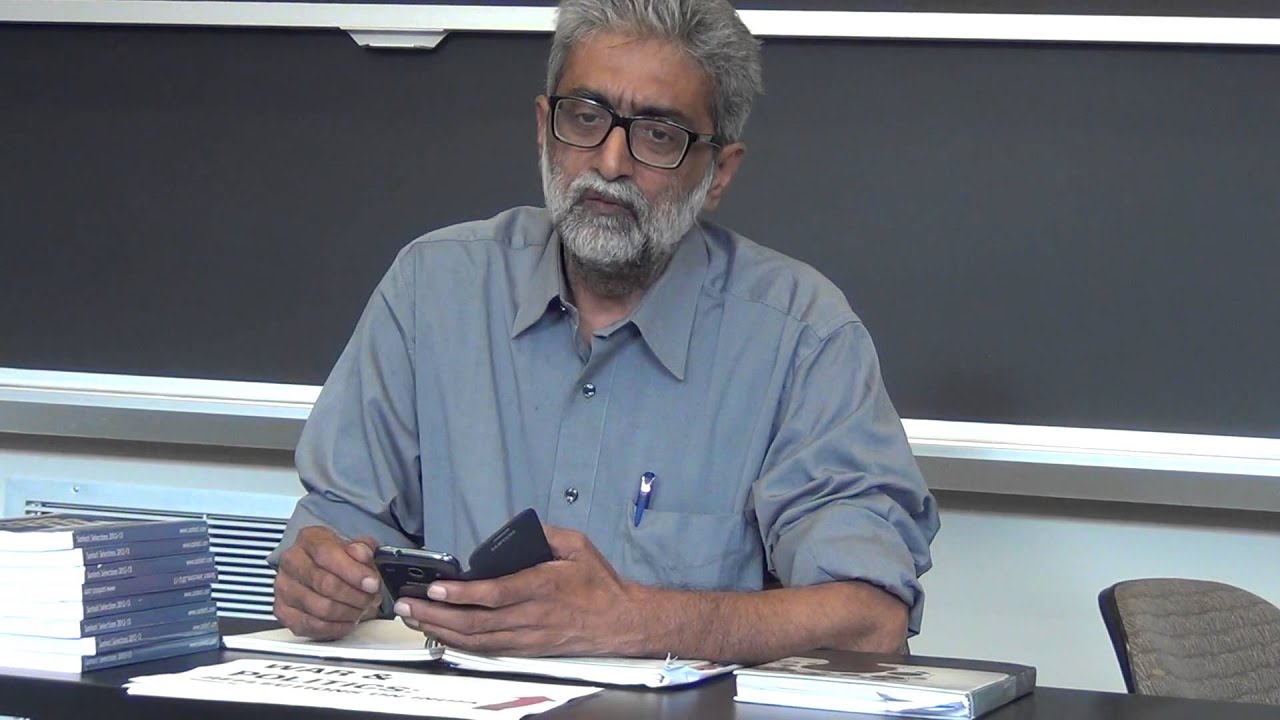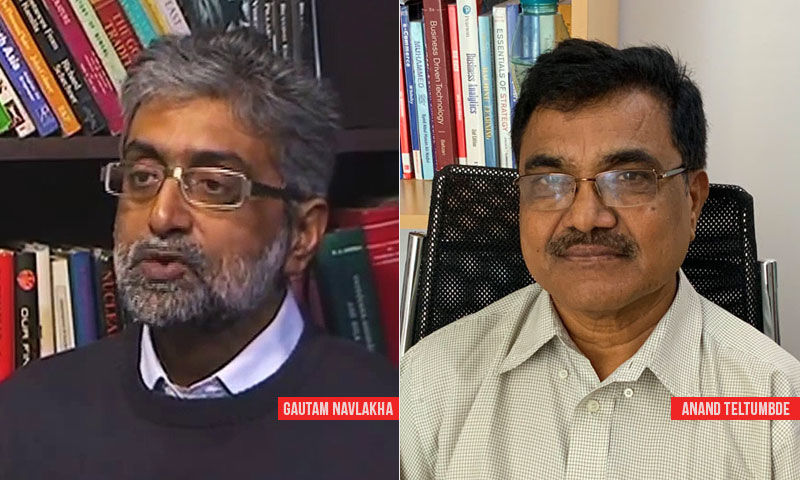A bench of Justices Arun Mishra and M.R. Shah asked both the activists to surrender within three weeks.
Anand Teltumbde, a file picture. Photo: Mandar Tannu
Gautam Navlakha, a file picture. Photo: TAUSEEF MUSTAFA/AFP
In a setback to civil rights activists Anand Teltumbde and Gautam Navlakha, the Supreme Court has rejected their anticipatory bail pleas filed in connection with the Bhima Koregaon case. Both face charges in connection with the violence that erupted on January 1, 2018, at Bhima-Koregaon, a village near Ahmednagar.
A bench of Justices Arun Mishra and M.R. Shah has asked Anand Teltumbde, who is based in Goa, and Gautam Navlakha, who lives in New Delhi, to surrender to the National Investigation Agency (NIA) in three weeks. The activists have also been told to turn in their passports.
Teltumbde, an eminent Dalit Scholar, and Navlakha, a well-known human rights activists and editorial consultant of Economic and Political Weekly, were booked under the dreaded Unlawful Activities (Prevention) Act (UAPA) for being part of the Elgar Parishad, which was a meeting of left activists and Dalit groups, and for the violence at the 200th anniversary commemoration of the Battle of Bhima Koregaon that followed this meeting and resulted in the death of one person and injuries to hundreds.
The police claimed that Maratha groups, instigated by the fiery speeches at the Elgar Parishad, attacked thousands of Dalits who had gathered at the village. Both Teltumbde and Navlakha have maintained that they were not part of the Elgar Parishad and no evidence on links to banned Maoists groups has emerged from the raids on their homes and offices. For this they have been spared close to 18 months in jail. Ten other activists, who face the same charges and additional charges of involvement in “anti-national” activities, which includes an assassination plot against the Prime Minister, were arrested in August and September 2018. Until recently they were lodged in Pune’s Yerwada jail. After the new Maharashtra coalition government of the Shiv Sena, Nationalist Congress Party and the Congress took charge in November 2019 all 10 were shifted to Mumbai’s Arthur road jail and subsequently the case was transferred to the NIA.
In what is believed to be a witch-hunt, several well-known and senior advocates have been helping the accused. Representing Teltumbde and Navlakha, senior lawyers Abhishek Manu Singhvi and Kapil Sibal argued that there was no prima facie case against the activists. There was also no evidence that connected them to the Bhima Koregaon violence or that they were members of banned Maoists organisations, the lawyers said. However, the Supreme Court order said the bench felt that there was sufficient evidence to file a prima facie case and dismissed the plea for anticipatory bail.
The anticipatory bail case dates back to November 2019, when Teltumbde and Navlakha had approached the Bombay High Court seeking pre-arrest bail. In February 2020, the Bombay High Court denied them the pre-arrest bail but extended interim relief until March 16, 2020. The activists then appealed in the apex court, which said the petitions were not maintainable given the material collected by the investigation agency. The court also gave weight to Solicitor General Tushar Mehta’s argument that custodial interrogation of Teltumbde and Navlakha was necessary for the investigation to proceed.
Navlakha statement
Thanking the Supreme Court for giving him three weeks to surrender, Navlakha, in a statement, said, “Now that I have to surrender within three weeks I ask myself – dare I hope to be freed from the burden of being accused in what appears to me, to be yet another conspiracy trial, one more in the long list of such trials? Will the co-accused and others like them get their freedom back? These questions creep in because of the times we live in where civil liberties are getting progressively squeezed, and where only one narrative dominates, backed by crassness in public life… The dreadful act – the Unlawful Activities Prevention Act – allows for banning of an organisation and outlaws its ideology. As a result, the most innocuous and legitimate of engagement and interaction can become criminal in the eyes of the State. It is a law that makes the very process an instrument of punishment, without even waiting for the trial and its outcome”.
The order came after a lengthy hearing. The court decided to pass a short order after considering the uncertainty surrounding its functioning in the wake of the COVID infection spread.
“I am not a violent reactionary of any sort. I have an intellectual approach which may on some issues be against the State. I have been used a mediator to urge people who use violence to turn away from it… But now they call me violent?” Mr. Singhvi, assisted by advocate Shadan Farasat, argued.
Also read | Understanding Bhima Koregaon
Mr. Sibal, for Teltumbde, said the probe agencies have not received any material or communication from his client or his house. Whatever they were using to build a case against his client was found in a computer.
Solicitor General Tushar Mehta countered that all others in the Bhima Koregaon case have been arrested, except Teltumbde and Navlakha. “We need their custodial interrogation. We have questions,” Mr. Mehta submitted.
At one point, Mr. Mehta referred to Varavara Rao, who is also an accused in the case, saying he was “supposed to be a poet” but there was evidence associating him with rocket launchers and grenades. Mr. Mehta said all the accused, including well-known lawyer, Sudha Bhardwaj, were “all acting in tandem”.
“This is not an offence against individuals but against the nation. It is for a reason that we are seeking custodial interrogation,” Mr. Mehta pressed his case. He said the “Maoist activities” of the two men was quite apparent. He claimed that there was enough evidence of involvement with separatists, which they happen to call “Liberation Struggle” in Kashmir. “They have consistently lost pleas for quashing the case against them. This shows prima facie that there is a case against them,” he argued.
In his rebuttal, Mr. Sibal challenged the prosecution to show if there was any direct evidence to show the direct involvement of the two activists. “Somebody may have written something referring to my name. But that does not implicate me,” he argued.
Justice Shah responded, “If this court has refused to interfere earlier and there is evidence that there have been references to you, is it not correct that there is a prima facie case against you?”
In September 2018, a majority judgment of the Supreme Court held that arrests made in the Bhima Koregaon case were not an attempt to silence dissenting voices in the country. It had given the go-ahead to the Maharashtra police to pursue the case under the draconian UAPA. Nationwide raids preceded the arrests of some of the accused persons.
Teltumbde and Navlakha had approached the high court seeking pre-arrest bail in November last year after a sessions court in Pune rejected their pleas.
Navlakha, Teltumbde and several other activists have been booked by Pune Police for their alleged Maoist links and several other charges following the violence at Koregaon Bhima village in Pune district on January 1, 2018.
All the accused have denied the allegations
UAPA is a dreadful law that makes the very process an instrument of punishment, without even waiting for the trial and its outcome, says the civil rights activist.Gautam Navlakha 16 Mar 2020

Image Courtesy: YouTube
In a statement released soon after being denied anticipatory bail by a Supreme Court bench, along with Anand Teltumbde, civil rights activist Gautam Navlakha says there is nothing “more pressing” for him than to clear his name.
Read the full statement below:
I thank Justices Arun Mishra and MR Shah of the Supreme Court for giving me three weeks to surrender before the NIA (National Investigation Agency). I am grateful to senior advocates Abhishek Manu Singhvi and Kapil Sibal for defending us. I cannot thank enough my dearest friends-lawyers for investing their precious time to represent me.
Now that I have to surrender within three weeks, I ask myself: Dare I hope to be freed from the burden of being accused in what appears to me, to be yet another conspiracy trial, one more in the long list of such trials? Will the co-accused and others like them get their freedom back? These questions creep in because of the times we live in where civil liberties are getting progressively squeezed, and where only one narrative dominates, backed by crassness in public life.
The dreadful Act — the Unlawful Activities Prevention Act — allows for banning of an organisation and outlaws its ideology. As a result, the most innocuous and legitimate of engagement and interaction can become criminal in the eyes of the state. It is a law that makes the very process an instrument of punishment, without even waiting for the trial and its outcome.
So, I am aware that I am joining the ranks of thousands of others who are made to suffer for their convictions.
To draw an analogy from test cricket, which to me is the best form of cricket, where endurance, patience, fair play, grit and redemption grace the game. It is these same virtues that I demand from myself in this ‘test match’ of my life. There is nothing more pressing than for me to clear my name.
To my friends, colleagues and family — I cannot thank you enough for standing by me through this period. I remain in your debt.
Do please listen to Leonard Cohen sing the ‘Anthem’ and remember to:
Ring the Bell,
Which still can ring
Forget your perfect
Offering
There is a crack,
A crack in everything
That’s how light gets in.
Gautam Navlakha
16th March,2020
New Delhi.

March 17, 2020 at 9:35 pm
The court not accepting the pleas of activists is not only setback to civil rights but also a blot on judicial system